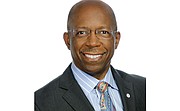Meeting on homeless issue turns tense
2/7/2020, 6 a.m.
A discussion meant to address and ease concerns for Richmond’s homeless residents quickly turned tense Wednesday afternoon.
Instead of a discussion of city strategies, the hourlong meeting at the Annie E. Giles Community Resource Center saw homeless residents, advocates, supporters and others criticize how the city has handled homelessness.
Yelling and loud comments from advocates and the homeless marked the meeting and, at one point, a participant grabbed a microphone from the meeting’s leader, City Councilwoman Ellen F. Robertson, though the microphone was quickly returned to her.
Still, the uproar appeared symptomatic of a lack of faith that the city is committed to finding solutions. The location for this session appeared ideal. A former soup kitchen, the center sits on Oliver Hill Way, just a few feet away from the Camp Cathy tent city where about 100 people unable to afford housing in the city have pitched tents and are now living.
The Giles Center also serves as the city’s emergency overflow shelter to keep people from freezing when temperatures are forecast to hit or drop below 40 degrees.
But despite the location, the meeting did little to assure concerned participants, who interjected and often loudly voiced their views despite attempts from Ms. Robertson to keep the discusssion civil and “respectable.”
“This has got to be a balanced conversation,” Ms. Roberston said.
“We believe housing is a right, not a privilege,” Mayor Levar M. Stoney stated in a release issued after the meeting. “We are working with nonprofit, faith-based, homelessness and social service providers to support this community and to work with each resident individually to address their unique challenges and circumstances.”
He promised that service providers will have a presence at the Annie Giles Center to connect people at Camp Cathy with services and more stable housing.
Many who attended the meeting, though, were suspicious, given the city’s most recent response to Camp Cathy. That suspicion is based on a city letter dated Dec. 30 and sent to Rhonda L. Sneed, the co-founder of the homeless service group Blessing Warriors RVA who started the encampment with the late Cathy Davis.
The letter from Reginald E. “Reggie” Gordon, Richmond’s deputy chief administrative officer for human services, told Ms. Sneed that the tent city needed to “be removed immediately,” citing unverified crime and health issues.
Mr. Gordon said Wednesday the city currently does not have any plans to close the camp or evict Camp Cathy residents. However, he did not respond to questions about whether he planned to rescind the letter or whether the city would take any action in the months to come to remove the rows of tents.
The volatile meeting followed the release of a Point-In-Time count survey from Homeward, a regional homeless coordinating agency, that showed a 10 percent increase in the number of single adults who are homeless in Richmond. The reported increase from 497 adults to 549 was the first such increase since 2011.
Pointing to the Richmond Justice Center across the street, Ms. Sneed questioned before the meeting the city’s priorities in aiding homeless residents, as she and volunteers prepared for an influx of more homeless people.
“Those people in the jail, they got a bed, they get meals and they built it because they said they needed air conditioning,” Ms. Sneed said. “What about here?”
“They don’t even care about these people,” she said, “and tonight we’re probably going to get 10 more people.”
As it turned out, some of those who work at the jail expressed their own concerns at the meeting. Alisha Banks, a case manager at the Justice Center, was critical of how the city’s homeless crisis line operates.
She said the hotline takes messages and requires those seeking help to have a cellphone to receive callbacks. She said undue responsibility is being placed on those seeking help, including many inmates who leave the jail after serving their time and wind up homeless and on the street.
A key part of the meeting was supposed to be a review of a draft strategic plan on homeless- ness that the city departments of Housing and Community Development and Social Services prepared.
The plan, which City Council requested Mayor Levar M. Stoney’s administration to develop, calls for the city to work with nonprofit providers to increase emergency shelter beds that provide overnight stays.
The two departments also want the city to increase its partnership with nonprofit and local outreach groups to develop more transitional beds that allow for longer stays. The report also spells out five other strategies that urge the city to beef up funding for homeless services and for the education for Richmond residents about the issue.
Michael Smith of Blessing Warriors RVA said the current draft shows that the city has done little to implement key elements of a 10-year plan released in 2008 to address homelessness and to increase housing options.
Others expressed concern that the city Department of Social Services relies too heavily on local nonprofits and private groups to handle homeless matters and should devote more of its own resources to the problem.
The city also was called neglectful of the homeless and only willing to get involved when homelessness hits a certain threshold. For many at the meeting, the city is doing too little to help those facing a housing crisis — certainly nothing on the scale of Atlanta, which raised $50 million last year to create 550 new housing units for the homeless.
One problem is a lack of easy communications that leaves those needing shelter without even basic information on availability.
“We have to be more humane,” said Bob Hummer, founder and executive director of Moments of Hope Outreach. “It is not right to expect somebody who is homeless to wonder ‘Is this building going to be open tonight or not?’ ”
One aspect of the plan that service providers and advocates seemed to agree with is the need for a homeless shelter that would be accessible all the time. People suggested using the Giles Center, the vacant Richmond Coliseum and vacant houses owned by the city.
“What we have outside is a fantastic opportunity for social services, mental health, physical health, employment agencies and organizations, because they’re pooled up in one location,” Mr. Hummer said. “We can serve them, we can process them out of homelessness right now.”
Seventy minutes into the discussion, Ms. Robertson and other city officials called it quits and departed as rain began falling.
That left supporters and residents of Camp Cathy to figure out their next steps as they headed out into a downpour. The homeless individuals scrambled to get inside their tents or sought cover under the entry of the locked building.







